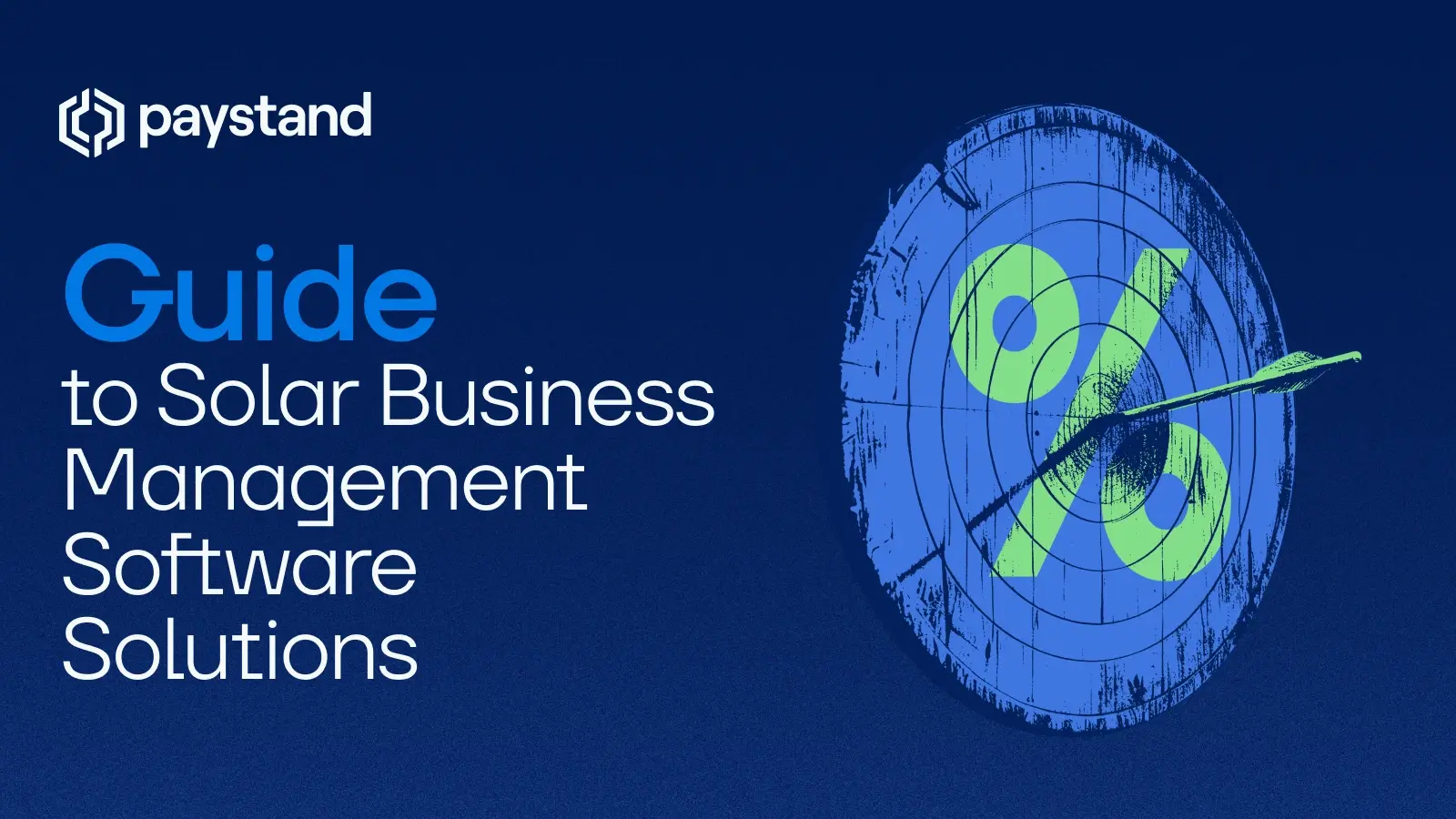Guide to Solar Business Management Software Solutions

Table of Contents
2. Best Solar Business Software Options for Different Needs
3. Top-Rated Solar Software Platforms for Sales & Field Teams
4. Solar CRM Software That Scales with Your Business
5. How to Optimize A/R and Payments with Paystand
6. How to Choose the Right Solar Business Management Software
7. Why Solar Business Management Software Isn’t Complete Without A/R Automation
Key takeaways
Solar business management software helps unify operations across sales, project delivery, and finance.
- Choosing the right platforms can improve efficiency for field teams, project managers, and A/R staff.
- Top software tools offer real-time visibility, integrated workflows, and scalable billing support.
- Paystand integrates with ERPs to add A/R automation that speeds up payments, reduces errors, and cuts transaction costs.
The solar market is gaining momentum, but not all companies are ready to scale. Business management software is becoming essential for teams that want to move fast, stay organized, and keep margins intact.
What Is Solar Business Management Software?
As solar companies scale, their operational needs grow more complex. Keeping customer data in spreadsheets, tracking jobs across whiteboards, and manually sending invoices no longer work when you’re juggling dozens of active installs and a multi-state team.
That’s where solar business management software comes in.
Unlike solar design or shading tools, this category of software focuses on running the business itself. It supports the full lifecycle of sales, operations, and finance.
Core components typically include:
- CRM: Lead capture, customer management, sales tracking
- Project management: Scheduling, status updates, crew coordination, and tools to track project progress
- ERP: Financials, reporting, inventory, vendor management
- Billing and invoicing: Milestone-based or subscription-based models
- Accounts receivable (A/R): Collections, reconciliation, cash flow visibility
Why it matters?
The average profit margin for solar installation companies is estimated to range between 8% and 10% depending on market, scale, and services offered. With margins this tight, even small inefficiencies in billing or collections can create serious cash flow strain.
That’s why solar businesses need centralized visibility and automation across sales, operations, and finance. The right solar business management software gives teams the tools to improve coordination, reduce costly delays, and protect margins.
Best Solar Business Software Options for Different Needs
The best solar business management software for your company depends on your workflows, team structure, and financial priorities.
Here’s a quick breakdown of common platform types, with their core strengths and limitations:
-
CRM-first platforms:
Ideal for: Lead generation, sales pipeline tracking, and customer engagement.
- Example: Salesforce with Blu Banyan’s SolarSuccess integration
Pros: Excellent for managing large volumes of leads and proposals. Highly customizable.
Cons: Often requires integration with project and finance systems for full visibility. -
Project-focused platforms:
Ideal for: Installation scheduling, crew coordination, and materials tracking.
- Examples: JobNimbus, AccuLynx
Pros: Strong field team features and visual job boards.
Cons: May offer limited financial tools or require separate billing platforms. -
ERP-centric platforms:
Ideal for: End-to-end operational and financial visibility.
- Examples: NetSuite, Acumatica, Microsoft Dynamics 365
Pros: Centralizes inventory, billing, reporting, and vendor management.
Cons: May lack advanced AR automation and user-friendly interfaces for sales or field teams.
Platforms like Paystand integrate directly with ERPs to fill those gaps—adding payment automation, real-time reconciliation, and blockchain audit trails without overhauling your existing systems.
For more ways to boost financial performance, check out How to Increase Solar Revenue.
Top-Rated Solar Software Platforms for Sales and Field Teams
Sales reps and installers are the front lines of any solar company. The best solar business management software enables your sales team to close deals faster and your field teams to execute efficiently.
Key features to prioritize:
- Proposal generation and digital signature tools
- Job tracking with real-time status updates
- Mobile access for scheduling, customer info, and install notes
According to EasySolar, the following tools support better coordination between sales teams and field teams—helping you track project progress, avoid delays, and improve customer experience:
- Aurora Solar: Fast, accurate proposals with shading and system modeling
- JobNimbus: Scheduling, team communication, and job status tracking
- Salesforce + Blu Banyan SolarSuccess: Solar-specific CRM with workflow automation
- AccuLynx: Mobile project management for crews and subs
Want to reduce friction from quote to payment? See Frictionless Payments in Solar.
Solar CRM Software that Scales with Your Business
A strong solar CRM software platform is more than just a contact database. It helps your team members manage leads, track conversations, automate follow-ups, and sync key data with project management and A/R systems.
Look for:
- Integrated proposal and contract generation
- Follow-up reminders and drip campaigns
- Scheduling and milestone syncing
- Real-time updates across departments
When CRM data flows into project delivery and invoicing, solar companies can close deals faster and minimize errors.
To learn more, check out How to Improve Your Solar Business with Modern Payment Tools.
How to Optimize A/R and Payments with Paystand
Most solar ERPs weren’t built for modern payment collection. Manual invoicing, check processing, and disconnected reconciliation all slow down cash flow.
Paystand solves this by embedding payment automation and AR tools directly into your ERP or financial system.
Related: How to Automate B2B Payments
Key Capabilities:
- Zero-fee digital payments: Eliminate costly processing fees
- Real-time payment visibility: Accelerate reconciliation
- Faster collections, fewer fees: Use automated reminders and multiple payment methods
- Blockchain audit trail: Ensure security, accuracy, and compliance
- Scalable platform: Supports growing project volume and payment complexity
One solar company, Allterra Solar, saw firsthand how A/R automation pays off. After adopting Paystand, they cut transaction costs by 51% and increased zero-fee payment volume by 41%.
“Paystand delivered a comprehensive, easy-to-deploy solution that allowed us to get paid faster and focus more on growing the business.”
– Allterra Solar
Read the full Allterra Solar case study.
For more on how blockchain and automation protect financial data, read Payment Security: How to Protect Your Business and Your Customers.
How to Choose the Right Solar Business Management Software
When evaluating platforms, consider your company’s biggest pain points:
- Are you struggling with lead management or job scheduling?
- Is your A/R process manual, error-prone, or slow?
- Do you need better financial reporting to support funding or growth?
Choose software that offers:
- Strong integration and APIs so your systems talk to each other
- Real-time data to support agile decisions
- A user-friendly experience across departments
Most important: make sure your ERP integrates with tools like Paystand to enable end-to-end visibility and automation.
Take it from Alterra Solar, which cut transaction costs by 51% and increased zero-fee payment volume by 41% after adopting Paystand’s platform.
Why Solar Business Management Software Isn’t Complete Without A/R Automation
As solar companies grow, the right solar business management software becomes essential for aligning sales, operations, and finance.
Platforms that combine CRM, project tracking, ERP, and billing help streamline workflows and improve visibility. And when paired with Paystand, they unlock faster collections, real-time data, and the infrastructure to scale with confidence.







